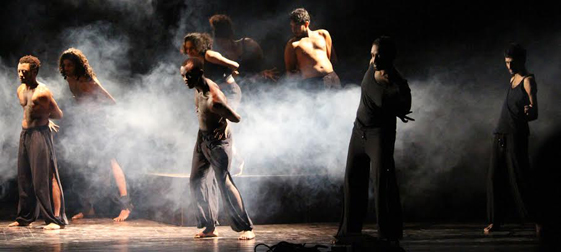|
DRAMA Review
Dear Children, Sincerely: A search for answers to questions that may
be forgotten
by Dilshan Boange
I watched Ruwanthie de Chickera's latest work of theatre on its
closing night in Colombo on January 31. An international collaboration
between artistes from Rwanda and Sri Lanka, staged at the Western
Province Theatre Resort, 'Dear Children, Sincerely' proved to be a
thought provoking series of sketches/episodes, with symbolic
expressionistic narratives, including stylised gestures, movements that
bore rhythm and motion for storytelling, all of which sought to move
beyond the spoken word.
 Although
the pre-performance introduction made over the sound system was
trilingual and in the order of English, Sinhala, and Tamil, the
performance was very much a multilingual one, which included diction in
Sinhala, English and also what was presumably of (a) Rwandan language.
However, I was intrigued to note that no Tamil diction was really
identifiably audible in the course of the multilingual dialogues and
utterances that were delivered from performances. Although
the pre-performance introduction made over the sound system was
trilingual and in the order of English, Sinhala, and Tamil, the
performance was very much a multilingual one, which included diction in
Sinhala, English and also what was presumably of (a) Rwandan language.
However, I was intrigued to note that no Tamil diction was really
identifiably audible in the course of the multilingual dialogues and
utterances that were delivered from performances.
The script of the performance was stated to have been developed on
interviews of elders from both Rwanda and Sri Lanka, on specific topics.
Interestingly enough, this wasn't a performance whose narrative was
solely through the action on the stage. Multimedia projector slides by
the side of the stage and voiceovers of those texts gave the background
and theme for each episode or sketch, before it came to life on the
boards. It was in that sense a twofold method of narrating a personal
account of an elder, of a historical event from either Rwanda or Sri
Lanka. A verbal statement coupled with a corresponding modern day
expressionistic theatrical statement.
Carefree game
A renowned and revered leader in the cause for world peace and human
rights, Desmond Tutu, is believed to have said -"When the missionaries
came to Africa they had the Bible and we had the land. They said 'Let us
pray.' We closed our eyes. When we opened them we had the Bible and they
had the land." The sketch that showed a carefree game of 'Rats and
Rabbits' between two African groups provided a symbolic narrative of how
French colonialism arrived in Rwanda, speciously, and with subtle but
effective invasiveness, which although doesn't highlight the component
of Christian evangelism involved as indicated by Desmond Tutu, most
certainly demonstrated the western colonial theory of 'divide and
conquer' and 'divide and rule' as practiced over 'natives'.
The colonist arrived adorned in shawls of the colours of the French
flag and bestowed them as gifts to label and thereby differentiate and
segregate the two groups of players. He ended up supporting the blue
shawl wearing 'rabbits' against the red shawl wearing 'rats' and
instilled what I call the 'Might Right', which westerners were infamous
for practicing in their colonies. Interestingly enough, the 'rabbits'
who were supported by the French colonist was the group with the
physically bigger made players and composed of a lesser number.
A numerical quantifiable 'minority' one could say. Identifying
divisible groups and then empowering a 'minority' and favouring them
over the majority, so as to establish a group of 'native collaborators'
to help the white man oppress the majority, was very much core to the
colonial theory of 'Divide and Rule'. The British practised it here just
as the French did it in Rwanda. The Sri Lankan Independence Day sketch
that delved into exploring the 'historical memory' of that historic
occasion and was, among other matters, rather focused on contesting the
notion of 'national identity', delivered a highly critical argument of
what the 'functionality' of the 'national flag' and the presence and
significance of that national flag ought to be at that occasion.
Maternal grandmother
True, as we age, we may tend to recall moments from childhood mostly
as visual glimpses. The verbal narratives of elders and the players
onstage all unanimously declared they either remember no flag's presence
or asserted 'there was no flag'. But was the sight of the national flag
utterly inconspicuous or its memory completely obscured to negation to
all the elders interviewed for this script? Depends on who was
interviewed I suppose? For the record, I still have my late maternal
grandmother, Nalini Madugalle Eramudugolla's diary of 1948. And in her
entry on February 4, she has noted several things related to the
celebrations that happened as well as polity changes such as -"Birth of
a new dominion. Governor sworn in as Governor General." And she, an 18
year old at that time, also noted-"hoisting of the lion flag."
 On
histories bespeaking of civil disarray that led to bloodshed and
breakdown of human reason, the Rwandan genocide of 1994 and the leftist
insurgencies here in 1971 and 1988-89 were the events that were focused
on to show how mindless brutality ruled the land, and humanity eroded,
wrecking an entire generation's future. A bus ride between Sinhala and
Tamil people where there is a tussle between them for one group to gain
supremacy over the other as helmsmen, depicted the social discord that
arose after the introduction of the Swabasha policy, which made Sinhala
and Tamil officials languages, but is now construed as the 'Sinhala Only
Act'. On
histories bespeaking of civil disarray that led to bloodshed and
breakdown of human reason, the Rwandan genocide of 1994 and the leftist
insurgencies here in 1971 and 1988-89 were the events that were focused
on to show how mindless brutality ruled the land, and humanity eroded,
wrecking an entire generation's future. A bus ride between Sinhala and
Tamil people where there is a tussle between them for one group to gain
supremacy over the other as helmsmen, depicted the social discord that
arose after the introduction of the Swabasha policy, which made Sinhala
and Tamil officials languages, but is now construed as the 'Sinhala Only
Act'.
In respect of stagecraft, what was seen was an austere minimalism in
terms of sets. The effect of lights was a strong point together with the
smoke machine effects, adding depth of visual impressions to the
audience that pronounced emotions of certain situations. 'Dear Children,
Sincerely' is not for theatregoers who seek popular entertainment on a
weekend to get their funny bone tickled and have a load taken off after
an exhausting week. It addresses those who believe theatre can teach us
to think and reflect about ourselves, as individuals and as collectives,
how we are subjects of the heritage(s) and histories we have inherited.
It addresses a search for answers to questions that may possibly not be
much remembered in times ahead. |

